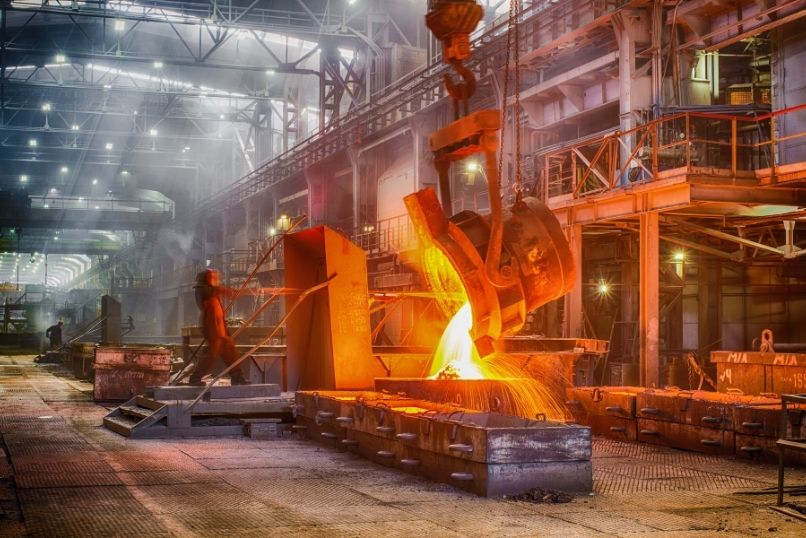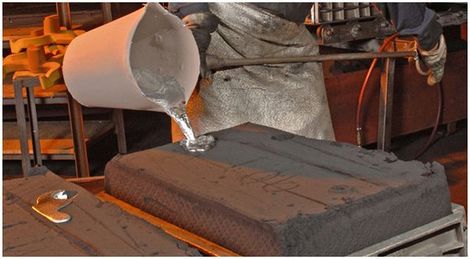How Aluminum Foundry Methods Are Changing Modern Manufacturing
Wiki Article
A Comprehensive Overview to Metal Casting: Advantages and Providers Used by Foundries
Metal casting is a crucial process in numerous sectors, supplying countless benefits via the solutions of factories. These facilities transform molten metal right into exact and sturdy elements, providing to particular customer demands. By utilizing innovative innovations, shops ensure top quality and efficiency in production. The intricacies of metal casting and the diverse methods entailed raise crucial inquiries concerning its role in contemporary production. What innovations lie in advance in this crucial field?Recognizing the Metal Casting Process
The metal casting process is a fundamental technique utilized in manufacturing to create complicated shapes and components. This approach entails putting liquified metal into a mold developed to form the desired item. The process begins with pattern creation, which acts as a template for the mold. Aluminum Foundry. Various materials, such as sand, metal, or ceramic, are made use of for mold-making, depending upon the details demands of the casting
When the mold and mildew is ready, molten metal is put right into it and enabled to strengthen and cool. After solidification, the mold and mildew is gotten rid of, exposing the cast component. Different techniques, consisting of sand casting, financial investment casting, and die casting, are utilized, each matched to different applications and products. Quality assurance steps, such as evaluations and screening, are important to assure the final product satisfies specs. Overall, the metal casting procedure plays an essential duty in creating parts for industries varying from automotive to aerospace.
Key Conveniences of Metal Casting
Metal casting provides significant benefits that make it a preferred production method in numerous industries. Its style flexibility and accuracy allow for complex shapes, while economical automation improves efficiency. Furthermore, the versatility and stamina of products used in casting add to the resilience of the last products.Style Flexibility and Accuracy
Launching amazing layout flexibility and precision, metal casting enables designers and designers to produce detailed shapes and functions that would certainly be difficult or impossible to achieve with various other producing approaches. This capability makes it possible for the manufacturing of complex geometries, internal structures, and great information that improve product functionality and appearances. Furthermore, various casting techniques, such as sand casting, investment casting, and pass away casting, supply additional alternatives for personalization, suiting diverse material residential or commercial properties and job demands. The versatility of mold and mildews allows alterations throughout the layout stage, simplifying the change from concept to final product. Ultimately, metal casting stands apart for its capability to provide high-precision elements, making it a very useful procedure in industries ranging from automobile to aerospace and beyond.Cost-efficient Automation
Cost-efficient mass manufacturing stands as one of the key benefits of metal casting, allowing producers to generate big quantities of components at a lower price each. This effectiveness develops from the capability to create intricate molds that can be recycled numerous times, substantially decreasing arrangement and operational prices. In addition, metal casting procedures, such as sand casting and die casting, enable high throughput, making it feasible to meet the needs of massive production runs. The reduced product waste and energy intake better improve cost financial savings, making metal casting an appealing option for sectors needing bulk elements. On the whole, the cost-efficient nature of metal casting settings it as a preferred technique for producers intending for economic performance in their production procedures.Material Adaptability and Toughness
Among the standout attributes of metal casting is its amazing product flexibility, which enables making use of a variety of steels and alloys. This flexibility enables makers to select materials that ideal suit their certain applications, from aluminum and bronze to iron and steel. Each metal uses special residential properties, including varying degrees of toughness, corrosion resistance, and thermal conductivity. Metal casting can produce elements that fulfill rigorous performance needs throughout varied markets, such as vehicle, aerospace, and construction. In addition, the stamina of actors metals can be improved with various therapy procedures, guaranteeing longevity and durability. Aluminum Casting. In general, the combination of material convenience and integral toughness makes metal casting a favored choice for creating high-grade partsKinds of Metal Casting Methods
Metal casting encompasses a range of methods that deal with different production needs and product homes. Typical techniques include sand casting, which utilizes a sand mold for intricate forms, and financial investment casting, understood for its precision and surface area coating. Pass away casting is another technique that uses high-pressure shot of molten metal right into mold and mildews, perfect for mass manufacturing of tiny parts.Shell molding offers a faster different, utilizing a resin-coated sand to develop thin-walled mold and mildews, while shed foam casting enables elaborate designs without the demand for a core.
Furthermore, continuous casting is utilized for generating long areas of metal, such as sheets or bars, by solidifying molten metal in a continual procedure. Each technique offers special advantages and is chosen based upon elements like the required information, production quantity, and material kind, making sure premium outcomes in metal manufacture across numerous markets.
The Duty of Foundries in Metal Casting
Factories play a pivotal duty in the metal casting process, working as the facilities where liquified metal is transformed right into finished items. These specialized establishments are furnished with the necessary devices and technologies to manage various steels, ensuring high-grade results. Shops are in charge of a number of critical features, consisting of melting the metal, pouring it right into mold and mildews, and enabling it to strengthen.In addition, they maintain stringent safety and security and environmental requirements to shield workers and lessen eco-friendly impact. Skilled specialists and engineers work together to enhance casting processes, enhancing performance and reducing waste. Factories also participate in quality assurance procedures, ensuring that the end products meet specific resistances and requirements. This go to my site quality guarantee is vital for industries that count on accurate components, such as auto and aerospace. Therefore, foundries contribute significantly to the general manufacturing landscape, allowing technology and development throughout numerous fields.
Personalized Metal Casting Providers
Personalized metal casting solutions supply customized style options that satisfy certain customer demands. These services also provide material option competence, making sure the ideal metal is selected for the desired application. Such adaptability and knowledge enhance the overall top quality and efficiency of the final product.
Customized Design Solutions
Customized style solutions in metal casting supply manufacturers with the versatility to develop elements that fulfill specific efficiency and aesthetic needs. Factories offer personalized solutions that allow clients to define dimensions, shapes, and surface area coatings to accomplish wanted results. This customization procedure often includes partnership in between designers and designers, guaranteeing that the end products align with operational requirements and sector criteria. Advanced technologies, such as computer-aided style (CAD) and simulation software application, make it possible for precise modeling and testing of elements prior to manufacturing, improving and decreasing mistakes efficiency. By leveraging tailored design services, companies can maximize capability while reducing waste and costs, ultimately resulting in a much more competitive edge in the marketplace. This flexibility is crucial for sectors calling for unique applications and specifications.Material Selection Knowledge
When choosing materials for metal casting, knowledge plays a vital function in guaranteeing that the best choice aligns with both efficiency needs and cost-effectiveness. Shops utilize proficient experts who understand the residential properties of different metals and alloys, allowing them to advise suitable materials for particular applications. Factors such as toughness, rust resistance, and thermal conductivity are thoroughly considered to fulfill the customer's requirements. Additionally, market patterns and advancements in product scientific research inform these decisions, allowing factories to remain affordable. By leveraging their expertise, shops can help customers in guiding through facility material choices, eventually resulting in boosted product top quality and lowered production costs. This customized knowledge is essential for attaining effective results in custom-made metal casting solutions.Quality Control in Metal Casting
Quality control in metal casting is important to assure that the last items fulfill the called for specifications and efficiency standards. Foundries use a selection of approaches and methods to assure the best of cast elements. This process starts with rigid product evaluations, confirming that resources follow sector criteria. Throughout the casting procedure, real-time tracking and testing are carried out to evaluate parameters such as temperature, mold honesty, and dimensional accuracy.
Applications of Metal Castings Throughout Industries
Metal spreadings play a vital role in numerous industries, acting as the backbone for plenty of applications. In the vehicle market, cast components such as engine blocks and transmission real estates are required for lorry performance and integrity. The aerospace industry counts on precision spreadings for critical elements that guarantee security and performance in flight. In addition, the construction market makes use of metal castings for fixtures, installations, and architectural elements, improving the durability of structures and facilities.In addition, the energy field benefits from spreadings used in generator blades and other devices crucial for power generation - Metal Foundry. The medical area also makes use of metal spreadings in tools and gadgets, showing the convenience of this manufacturing procedure. Generally, metal castings are essential to the performance and advancement of varied fields, showcasing their value in modern technology and framework development
Regularly Asked Questions
What Materials Are Commonly Used in Metal Casting?
Typical materials used in metal casting consist of aluminum, iron, brass, steel, and bronze. Each material offers special properties appropriate for numerous applications, enabling producers to pick the most effective dig this alternative based upon deterioration, toughness, and weight resistance.The length of time Does the Metal Casting Refine Normally Take?
Get More InformationThe metal casting process generally takes several hours to a couple of days, relying on factors such as the intricacy of the style, kind of metal made use of, and the certain casting method used by the factory.
What Is the Environmental Influence of Metal Casting?
The environmental influence of metal casting consists of power consumption, exhausts, and waste generation. Factories frequently apply procedures to mitigate these results, such as recycling products and utilizing cleaner modern technologies to decrease their eco-friendly footprint.Can Metal Casting Be Provided For Small-Scale Projects?
Metal casting can undoubtedly be done for small jobs. Various factories accommodate such requirements, supplying personalized remedies that accommodate minimal production runs while preserving high quality and precision in the end products.What Are the Precaution in Metal Casting Foundries?
In metal casting shops, safety procedures consist of personal protective tools, proper ventilation, training on devices usage, emergency procedures, normal upkeep checks, and adherence to industry security requirements to decrease risks related to liquified metal and hazardous materials.Furthermore, metal casting processes, such as sand casting and pass away casting, permit for high throughput, making it viable to fulfill the needs of massive manufacturing runs. One of the standout features of metal casting is its impressive material versatility, which permits for the usage of a wide array of steels and alloys. Additionally, continuous casting is utilized for creating long sections of metal, such as bars or sheets, by solidifying molten metal in a constant process. Shops play a pivotal function in the metal casting procedure, offering as the facilities where molten metal is changed into finished items. Typical materials used in metal casting consist of aluminum, iron, steel, brass, and bronze.
Report this wiki page